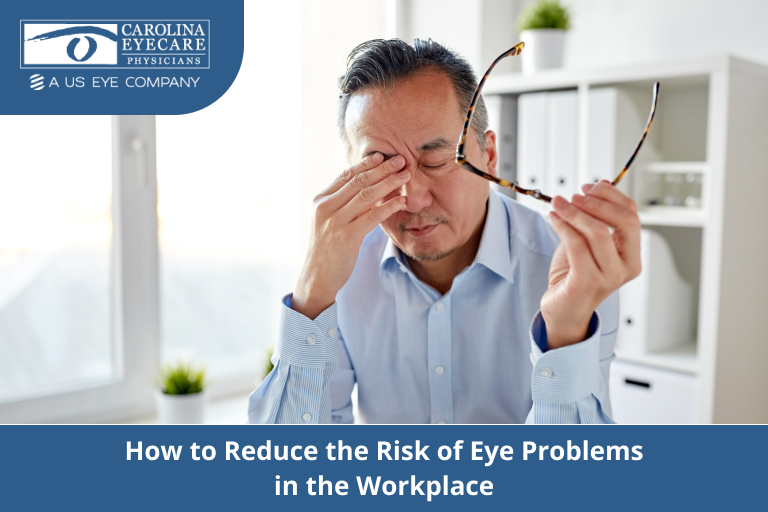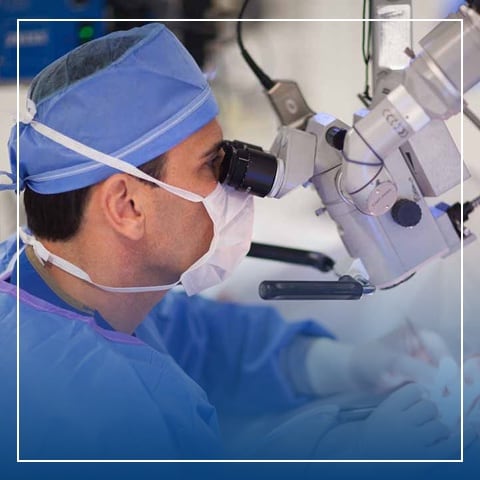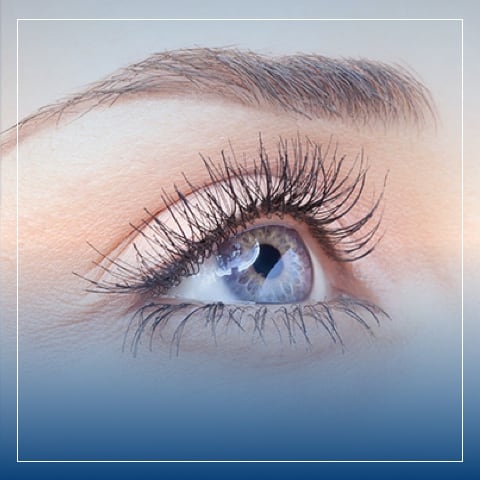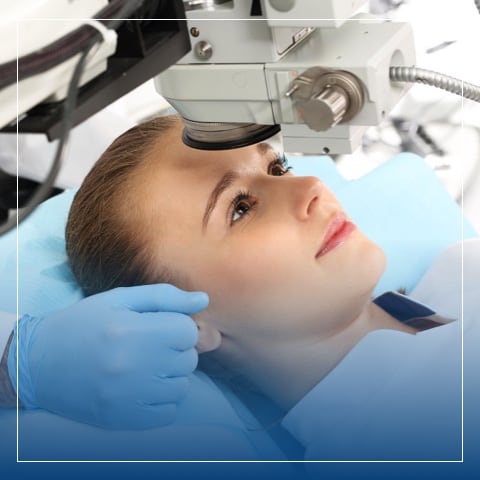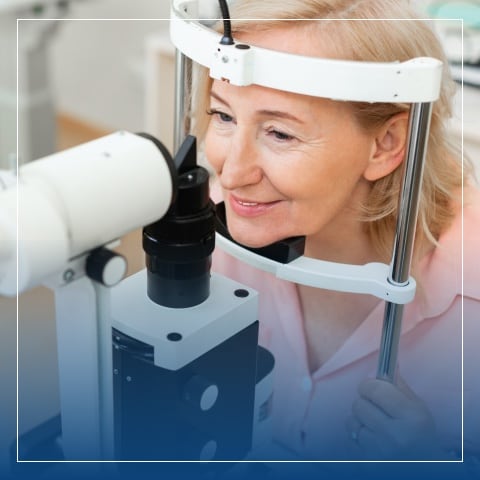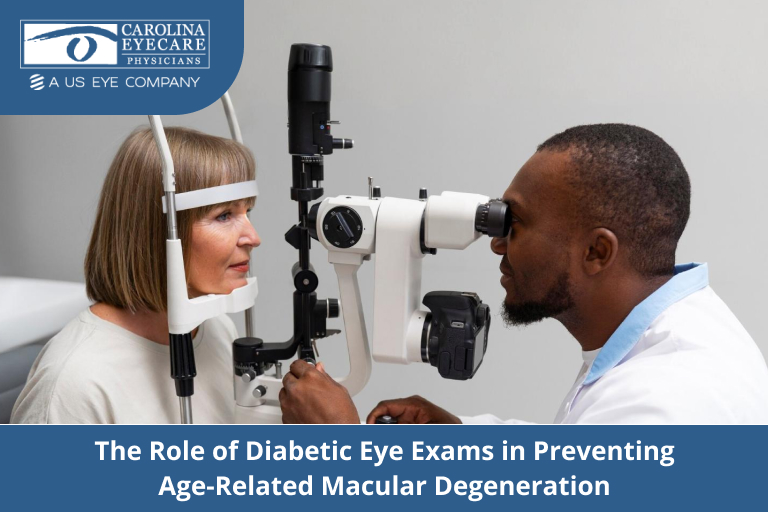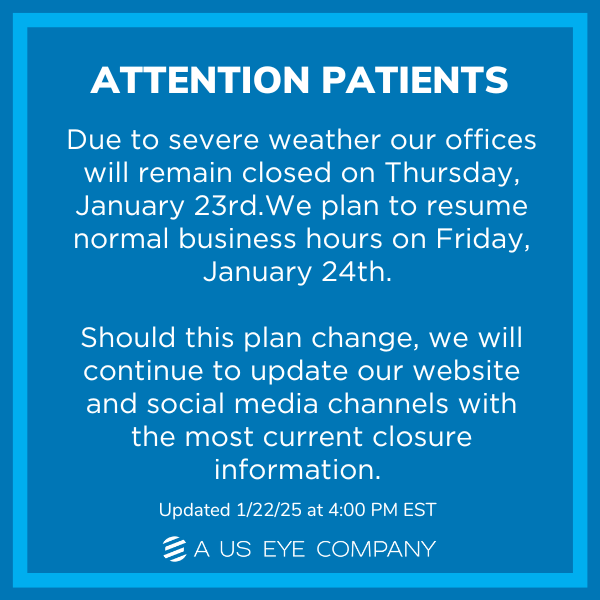Reviewed By: Dr. Kimberly Carter, OD
In the hustle of modern workplaces, our eyes work overtime—be it glued to screens, navigating bustling offices, or handling tools and chemicals. Yet, we often overlook the strain until it manifests as constant rubbing, headaches, or blurred vision.
Eye problems at work aren’t just about accidents or dramatic injuries. A lot of damage happens slowly, over time. Whether sitting in front of a computer all day, working on a construction site, or dealing with tiny parts in a factory, your eyes might be at risk. The good news? A few smart habits can go a long way in keeping them safe.
Screens: The Silent Eye Strainers
If you work on a computer, chances are you’ve dealt with dry eyes, eye strain, or that irritating burning sensation interrupting your focus during the day. This is called digital eye strain, and it’s one of the biggest workplace eye problems today. Ignoring dry eye problem makes it even worse. In fact, 68% of employees experience symptoms like blurred vision, dry, itchy eyes, and strain, while 59% say it affects their productivity.
Here’s what helps:
- Blink more – It may sound too simple, but we blink less when we focus on screens. That dries out the eyes. A conscious effort to blink more helps keep them moist.
- Follow the 20-20-20 rule – Every 20 minutes, look at something 20 feet away for 20 seconds. It relaxes your eye muscles and keeps strain in check.
- Adjust screen brightness and contrast – Your screen shouldn’t be brighter than your surroundings. If your phone screen feels like a flashlight in the dark, it’s too bright.
- Keep screens at arm’s length – Your monitor should be about 25 inches away and slightly below eye level. Any closer, and your eyes work harder than they should.
Dr. Laura Belka, OD, an experienced optometrist at Carolina Eyecare Physicians, often sees patients struggling with digital eye strain. She advises simple lifestyle adjustments, like proper lighting and screen positioning, to significantly reduce discomfort. Regular adult eye exams will help to control the situation.
The Wrong Lighting Can Wreck Your Vision
Harsh fluorescent lighting or dim workspaces force your eyes to overcompensate, leading to strain and headaches. If you work in an office, natural light is your best friend—position your screen to reduce glare and avoid overhead lights hitting directly on it.
If you work in a factory or a warehouse:
- Make sure task lighting is well-placed so you’re not squinting.
- Reduce glare with anti-glare coatings on glasses or matte screen filters.
- Take breaks if you’re working under artificial lights all day—step outside if possible.
Safety Glasses Aren’t Optional
Eye protection isn’t a suggestion for people working with tools, chemicals, or flying debris—it’s a must. But here’s the issue: many people don’t wear their safety glasses correctly or skip them for quick tasks. And the numbers prove how risky that is.
Each day, about 2,000 U.S. workers suffer job-related eye injuries serious enough to require medical treatment. What’s worse? Experts say that 90% of these injuries could be prevented or minimized with the proper eye protection.
Common excuses for skipping safety glasses:
- “I was only grinding for a second.”
- “The dust wasn’t that bad.”
- “My glasses fog up, so I don’t wear them.”
And then? Metal shards, sawdust, or chemical splashes lead to permanent damage.
How to make sure your eye protection works:
- Use the right kind of glasses for the job (ANSI-rated safety glasses for impact protection, goggles for chemicals, etc.).
- If they fog up, use anti-fog wipes or sprays—don’t just take them off.
- Replace scratched or old lenses. Scratched lenses reduce visibility and can cause more strain. Senior eye care doctors can help you to understand more about eye protection tips.
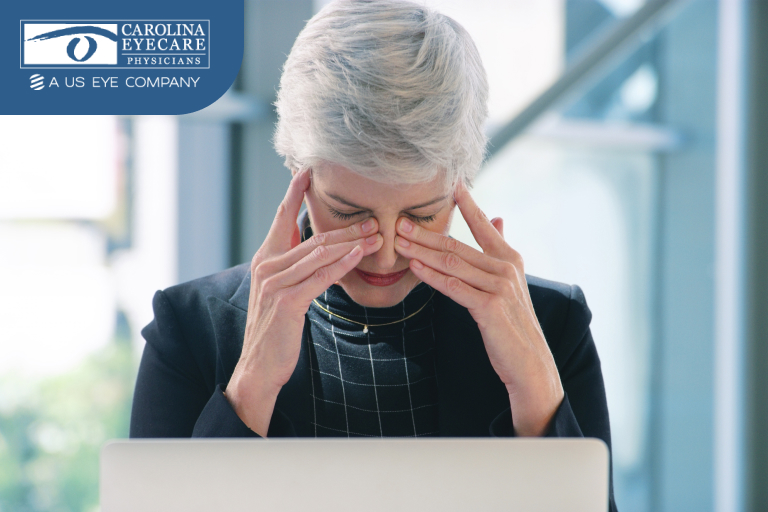
Dry Eyes Are More Than Just Annoying
Office workers, factory workers, and even delivery drivers struggle with dry, irritated eyes—often because of air conditioning, heaters, or staring at screens too long.
Simple fixes:
- Keep a bottle of artificial tears at your desk. Use them when your eyes feel dry.
- Drink water—your eyes need hydration just like the rest of your body.
- Avoid direct AC or heating vents blowing in your face.
If dry eyes persist, Dr. Kimberly Carter, OD, a specialist in dry eye treatment at Carolina Eyecare Physicians, recommends advanced therapies like IPL or LipiFlow to help patients find lasting relief.
Contact Lenses and Workplace Risks
Contact lenses are convenient but don’t protect your eyes from hazards. If you work in a dusty environment, are around chemicals, or near intense heat, contacts can trap particles against your eye or dry them out faster than usual.
What helps:
- If you must wear contacts at work, pair them with safety glasses to protect against debris and chemicals.
- Consider switching to daily disposables if you work in environments where dust or small particles are common.
- If your eyes get red or irritated often, wearing glasses might be a better option at work.
Chemical Exposures – The Risk Most People Underestimate
A splash of cleaning solution, hand sanitizer, or industrial chemicals can cause serious eye damage. And it happens fast. If anything gets into your eye, don’t panic—act immediately:
- Flush with water for at least 15 minutes. Not a quick rinse—15 full minutes under running water.
- Don’t rub your eyes—it can make things worse.
- If irritation continues, see an eye doctor ASAP.
For those who work with chemicals daily, goggles are non-negotiable. Regular safety glasses aren’t enough—you need goggles that seal around your eyes.
Eye-Friendly Work Habits Make a Difference
Beyond specific risks, simple daily habits keep your vision sharp over time:
- Eat well – Nourish your eyes with leafy greens, fish, and nuts, which are packed with essential nutrients for eye health. Making mindful food choices can help keep your vision sharp and strong.
- Get your eyes checked annually – Vision changes can sneak up on you. If you notice you’re squinting more or struggling with headaches, you might need glasses or an updated prescription.
- Don’t ignore discomfort – If your eyes are constantly irritated, dry, or in pain, something’s off. It’s better to get it checked than to let it turn into a bigger problem.
Final Thoughts…
Most people don’t think about their eye health until something goes wrong. Luckily, eye injuries and strain are preventable if you’re aware of the risks and take small steps to protect yourself. Whether adjusting your screen setup, wearing safety glasses, or taking breaks, these small habits can save your eyesight in the long run.
If you’re experiencing persistent discomfort, Carolina Eyecare Physicians is here to help. With years of experience in vision disorders, dry eye treatment, and workplace-related eye conditions, we offer personalized care to keep your vision in top shape.
Your vision is too valuable to take for granted. Protect it now, so you’re not dealing with serious problems later. Book an appointment with Carolina Eyecare’s doctors today or visit our eye exam centers.

